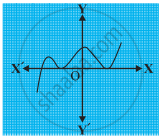Advertisements
Advertisements
Question
Find the zeroes of the polynomial `f(x) = x^2 ˗ 2x ˗ 8` and verify the relation between its zeroes and coefficients
Solution
`x_2 ˗ 2x ˗ 8 = 0`
⇒ `x^2 ˗ 4x + 2x ˗ 8 = 0`
⇒ `x(x ˗ 4) + 2(x ˗ 4) = 0`
⇒ `(x ˗ 4) (x + 2) = 0`
⇒ `(x ˗ 4) = 0 or (x+2) = 0`
⇒ `x = 4 or x = −2`
Sum of zeroes =`4+(-2)=2=2/1="-(Coefficient of x)"/(("Coefficent of" x^2))`
Product of zeroes =`(4) (-2)=-8/1="(Constant term"/((Coefficcient of " x^2))`
APPEARS IN
RELATED QUESTIONS
The graphs of y = p(x) are given in following figure, for some polynomials p(x). Find the number of zeroes of p(x).

Find the zeroes of the polynomial `x^2 + x – p(p + 1) `
If 3 is a zero of the polynomial `2x^2 + x + k`, find the value of k.
If 1is a zero of the quadratic polynomial `ax^2 – 3(a – 1)x – 1`is 1, then find the value of a.
Find the sum of the zeros and the product of zeros of a quadratic polynomial, are `−1/2` and \ -3 respectively. Write the polynomial.
Find the value of k such that the polynomial x2-(k +6)x+ 2(2k - 1) has some of its zeros equal to half of their product.
If the zeroes of the quadratic polynomial x2 + (a + 1) x + b are 2 and –3, then ______.
The zeroes of the quadratic polynomial x2 + 99x + 127 are ______.
If p(x) is a polynomial of at least degree one and p(k) = 0, then k is known as ______.
If the graph of a polynomial intersects the x-axis at exactly two points, it need not be a quadratic polynomial.
